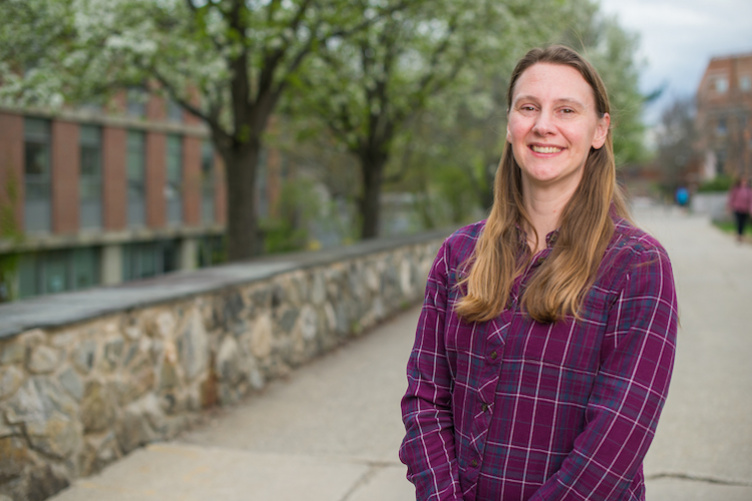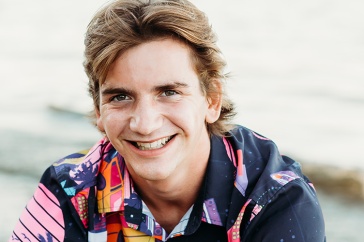
Melissa Aikens, assistant professor biological sciences
"I’m a classic case of having had an amazing teacher who challenged me. I took AP biology in high school and knew when I went to college I was going to be a biologist. I went to Bowdoin and majored in biology mostly because I wanted to do the research. It’s kind of a cliché, but I wanted to cure cancer.
Right from the start, I loved it. Then I took ecology. That course changed the entire trajectory of my college career. I realized I could actually have a job outdoors. I was so excited; I took all the courses I could. I got an NSF (National Science Foundation) fellowship to do research at the Dauphin Island Sea Lab off the coast of Alabama and very quickly knew marine biology wasn’t for me — I got seasick on the boat. There was all this marine life. and my peers were saying ‘This is so cool,’ and I thought, ‘Do I have to touch that?’ That’s the good thing about being an undergraduate: You can try on different things and figure out what you like and what you don’t like. I learned I was afraid of the ocean.
Then I graduated and had no idea what I was going to do. For a couple of years, I worked in environmental education, spending three months with the Appalachian Mountain Club leading trips to huts in the White Mountains and a year in West Palm Beach taking kids on day trips. They were pretty different experiences.
I spent a lot of time reflecting on what it was I liked about ecology and found I was really interested in plants. I had a little trepidation around animals because they bite and they move around. I decided to pursue forest ecology and started looking into master’s programs. I went to Yale University and got a master’s in forestry science.
During the summer, I did field work in the 'Quiet Corner' of Connecticut. I had to identify plants in different contexts and add data to a long list of existing data. When I got to the end of the program, I still didn’t know what I wanted to do. It seemed pretty natural to go on to a Ph.D., but I still wasn’t certain, so I ended up teaching science at a middle school outside of Boston. I had no direction, no training, no experience teaching. I was hired as a long-term sub, taking the place of a teacher the kids loved, and they just tromped on me. Somehow I survived, and when a full-time position came up, I took it. That’s when I realized I loved teaching. But I didn’t love the classroom management; it was the wrong level for me. The other teachers, it was like they were born for middle school. I thought, well, I love teaching, I love science, so I’ll go teach college.
I went to the University of Virginia for my Ph.D. and it was as stressful as I’d imagined. It was also amazing. I was studying a plant found in the meadows at the top of the mountains. There were no rattlesnakes, no poison ivy. I would have moments when I was engrossed in collecting data and I’d look up and there were all these beautiful mountains. It was an amazing setting.
Not that it was always like that. I camped during field seasons; the first one it rained the entire time I was out there, about three weeks. Everything I had molded. I was alone a lot. Sometimes I’d come back to my campsite and someone would be occupying it. Once I came back to a party going on. I’d talk to friends who had ‘real jobs’ in an office and they’d say, ‘What are you doing?’
I took a course for future faculty on good classroom practices that talked about active learning, and it was really eye-opening. It’s basically what I was taught to do in a middle school classroom: Engage students in the learning process. I started thinking about how I could use it in my own classes — I was a TA in a pretty large lecture course. The first time I tried it, I was terrified. But I told the students what to do, and they did it.
Then graduation came. I really wanted to work at a small liberal arts college, but the jobs were very competitive. I knew I would have to do post-doc work and told myself to just accept that I’d have to do two to four more years of research. I was trying not to pigeonhole myself and figured it was a good time to explore my options.
It was around then that I got a call from a PI (principal investigator on a grant) who wanted me to work with her on education research at the University of Georgia. After one semester, she accpeted a position at the University of Texas in Austin. I decided to go, too, but delayed the move a semester so I could teach as an adjunct at a local college in Virginia and gain more experience.
The post-doc work in Texas was really different. It was like starting from square one. It was based in psychology, sociology, training me to become a discipline-based education researcher. I was becoming a social scientist. It was a steep learning curve, but it was fun to do research to better my teaching.
I can look back at the long trajectory — I started as an undergraduate in 1996 — and see it’s always been science and education. Clearly I was meant to be a teacher. I was in post-doc research for about 9 months before the next set of academic jobs came up, but I wasn’t going to apply because I had funding for another year. That’s when the UNH job came up. I thought, well, it’s pretty early, but I would love to teach there, and it would be good practice to apply. So I did, and I got it. I started here in January 2016."
Aikens conducts research in undergraduate biology education, a field that aims to understand the teaching and learning of biology.
















































